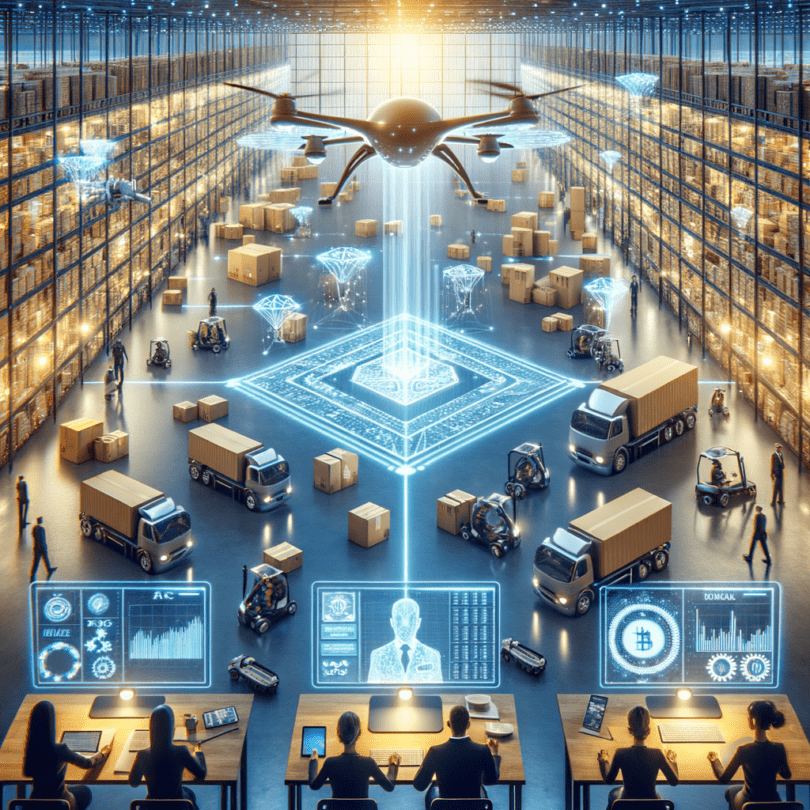If you’re anything like me, the word “blockchain” might spark thoughts of Bitcoin, or that one cousin who brings up cryptocurrency at every family dinner. Honestly, at first, I used to roll my eyes and think, “Oh, here we go again with the Bitcoin chat.” But I’ve come to realize that blockchain isn’t just about digital money. It’s got this massive potential to shake things up way beyond that, including in something as fundamental as the supply chain. Picture this: your favorite snack zooming to you from halfway across the globe with more transparency and maybe even more ethical practices, all thanks to blockchain. Sounds a bit like something out of a sci-fi flick, right? But it’s real.
The Allure of Boom and Bust
Let’s rewind for a second. Efficiency in supply chains isn’t exactly a brand-new concept. People have been finding ways to move their goods from Point A to Point B since ancient trading days, dodging all sorts of hurdles along the way. Fast forward to our bustling global marketplace, and you’ll see the need for spruced-up supply chains is just crazy high.
But, of course, there’s always a snag somewhere. Our globally connected market is fantastic, but it can also be this jumble of inefficiencies and—let’s be honest—sometimes a little shady. There are so many hands on the goods before they reach us—think warehouse folks, shippers, suppliers, retailers—all adding their mix of costs and potential for oopsies or outright mischief. If you’ve ever played a game of telephone, you know how messages can get twisted. The supply chain kind of feels like that sometimes.
A Technology to the Rescue
Here’s where blockchain swoops in. It may sound suspiciously nerdy, but think of blockchain as that super-organized friend in a group project who ensures everything’s done right and on time. They’re all about transparency, order, and truth. Now, plop this friend down in the middle of a supply chain, and things can get exciting fast.
Blockchain is, at its essence, a digital ledger system. It records stuff across a bunch of computers in such a way that altering any one record after the fact is a major mission impossible. It makes everything super transparent and secure. Imagine tracking inventory with detective-level accuracy—it’s a bit like having Sherlock Holmes investigate each item with a digital magnifying glass.
The Layers of Transformation
1. Transparency and Traceability:
Remember the big lettuce recall in the U.S. not too long ago due to E. coli? Whole aisles were emptied, not because every lettuce head was contaminated, but because they couldn’t figure out which batches were bad fast enough. Blockchain could change that, allowing instant tracking of food origins. It’d be like having a diary of everything baby cabbage went through—each rain shower and sunny day spelled out before it got to your table.
2. Speed and Reduced Costs:
With blockchain, every single transaction is updated in real-time. Forget the late-night thoughts about “What was happening with that shipment between Kansas and Kentucky?” Everything’s right there, plain as day. Imagine cutting through tons of annoying red tape, saving money, and losing fewer hairs to frustration. A future where your package doesn’t randomly tour the country before reaching your door—yes, please!
3. Sustainable and Ethical Practices:
We’re all about sustainability these days, right? Blockchain makes it possible to verify claims about eco-friendly sources. Want your chocolate bar to be genuinely fair-trade and not leave a massive carbon footprint? Blockchain can provide that kind of transparency, ensuring companies are accountable and fostering trust, perhaps even leading us to make more ethical choices.
4. Risk Mitigation:
Okay, let’s talk risks—like data breaches and fraud. Blockchain’s setup makes tampering a herculean task, offering security that’s top-notch. It could save companies a bundle while gaining consumers’ trust. Picture it as a fortress, protecting all critical supply chain info.
The Road Ahead with a Few Bumps…
But not everything’s rosy and perfect with blockchain in supply chains. There’s chatter about the energy it guzzles—especially those older models—and getting everyone on board is like herding, well, cats. Yet, tech is always evolving, and with newer, efficient systems, these kinks might smooth out over time.
The truly thrilling part? This isn’t some pie-in-the-sky theory—it’s happening right now, bit by bit. Companies are waking up to blockchain’s potential, running trials, making tweaks, and inching closer to that once-thought-impossible future.
Honestly, it’s kind of thrilling to envision a supply chain working like a perfectly tuned orchestra—every piece in harmony, clear and honest. No more sour notes or surprise solos.
So there you have it—blockchain might sound like it belongs in an intense tech chat or sci-fi book, but it’s shaping up to be a hero in disguise for our critical supply chains. We’re talking about real change, pushing boundaries, and reshaping how goods, ethics, and efficiencies mix. It’s a bit like witnessing an awakening of the structures our modern lives lean on.
Who would have thought a word that seemed reserved for coder conversations or sci-fi sagas could bring about this much transformation? And as I sit here, savoring my coffee, pondering its origins, it’s comforting to know that soon, thanks to blockchain, the answer could be just a quick look away.

